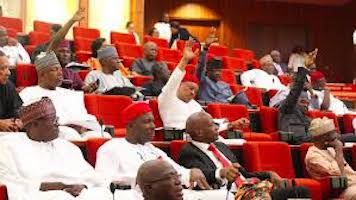Education
Former Anambra Chief Judge Calls for Teaching of History in Schools

Former Chief Judge of Anambra, Prof. Peter Umeadi, has called for the re-introduction of teaching of History in secondary schools and in tertiary institutions.
This, he said, would promote the learning of peoples’ cultures.
Umeadi made the call on Monday in Enugu at the 80th birthday celebration of Prince Chukwuemeka Onyesoh of Nri Kingdom and presentation of Onyesoh’s book entitled “Dirt on White Spectrum’’ in Enugu.
He noted that the teaching of History as a subject would be of great benefit to the younger generation.
Umeadi said: “Nri is not just the centre of Igbo culture and religion, but the beginning and centre point of civilisation in sub-Sahara Africa covering pre-colonial Nigeria.
’’He urged Onyesoh to ensure that the book is placed in all libraries in Nigeria as well as in every secondary school in Igbo land as the book is the power of Igbos.
Reviewing the book, Prof. Chris Ebigbo, said it is a rescue mission for the throne of Eze Nri in Agukwu Nri since 1911 when British missionaries dethroned the ruling Eze Nri Obalike over 110 years ago.
Ebigbo is Professor of Art (Bronze casting) and Anthropology.
“The author tells us the relevance of the Nri throne under the rule of Eze Nri at Agukwu Nri and how its desecration affects the lgbo nation in Nigeria today, culturally, politically and economically.
“He demonstrated that Nri Kingdom and hegemony under the rulership of Ndi Eze Nri at Agukwu Nri, was the first kingdom in 1gbo land controlling 118 towns; and is also the first kingdom in Nigeria.
“The book presents how the Igbo cultural history, customs and traditions were regulated by Ndi Eze Nri in Agukwu Nri since 900 AD,’’ he said.
He said removing the dirt on the white spectrum of Eze Nri throne would not only reposition the Nri Kingdom and hegemony, but the entire Igbo nation politically, culturally and economically in the present Nigeria.
According to him, the book is a show of the author’s concerns about the evils, neglect and abuse of Nri Kingdom and hegemony under the rulership of Ndi Eze Nri of Agukwu Nri since 900 A.D.
Responding, Onyesoh said he was motivated into writing the because of the falsehood by Western scholars who said that Igbo were not organised and had no kingship but village-based.
“The people who wrote these things were highly educated professors and I was pained when they say that Igbo do not have kingship, but white men came and introduced warrant chieftaincy to us.
“The benefit of the book is that it will make us to rediscover ourselves and reject the idea that we have no kingship and culture,’’ he stressed.
Onyesoh claimed that Nri culture dated back to 900 years ago even before Ife and Benin cultures and kingships came to be.
“I am 80 years today and I want to be remembered for righting what is wrong and my book under review contained six chapters and 377 pages,’’ Onyesoh said.
He added that preparations had been made to ensure that the book got to all libraries in the country through the Ministry of Information and Culture. (NAN)

JAMB: YabaTech Backs Oloyede’s Leadership Style, Urges Others To Take Cue
The Yaba College of Technology (YabaTech) has declared its total support for the Joint Admissions and Matriculation Board (JAMB) leadership amidst the 2025 Unified Tertiary Matriculation Examination (UTME) developments.
Dr Ibraheem Abdul, Rector of Yabatech, disclosed in a statement on Friday in Lagos.
Abdul said that Prof Oloyede’s heartfelt apology and assumption of full responsibility demonstrated commendable leadership and integrity.
“We stand in solidarity with Prof Oloyede, we are with him in the future he beholds for JAMB. We reaffirm our confidence in his visionary leadership and urge other leaders in the country to take a cue from his leadership style,” he stated.
According to him, YabaTech remains committed to supporting JAMB’s initiatives and reforms aimed at enhancing the integrity and efficiency of its examination processes.
The rector noted that the recent technical glitches that affected approximately 379,997 candidates across 157 centres, particularly in Lagos and the South-East states, had understandably caused distress among students and stakeholders.
“As the Rector, and a dedicated advocate for educational excellence in Nigeria, I extend my unwavering support to Prof Is-haq Oloyede, Registrar of JAMB, and his entire team during this challenging period following the uproar concerning 2025 UTME.
“His commitment to transparency and prompt corrective measures, including the rescheduling of examinations for affected candidates, underscores his dedication to upholding the credibility of our educational assessments.
“This incident serves as a catalyst for all educational stakeholders to collaborate more closely, ensuring robust systems that can withstand unforeseen challenges,” he added.
The rector noted that though the overall performance in the 2025 UTME had raised concerns, it was, however, imperative to recognize the complexities involved in administering large-scale examinations in a technologically evolving environment. (NAN)
Education
UNICEF, GAVI Donate Four Ambulance Boats, Generator to Bayelsa

From Mike Tayese, Yenagoa
The United Nations Children’s Education Fund (UNICEF) and its partners on Tuesday donated another four Ambulances Boat to the Bayelsa state government for easy access to healthcare in riverine communities.
Other items donated were one sound proof generator 30kva to the Primary Healthcare Board for smooth running of day to day activities of the board and to facilitate healthcare delivery.
Speaking during the handing over ceremony at the my government jetty Ministry of Transport, Chief of Field UNICEF Nigeria Office, Judith Leveillee said the boat means a lot more than just an ordinary boat, saying it is a means to save lives, to save God giving lives.
According to her, everyone must make sure the boats are used for the purpose of which it is intended and “I want to recognize the hard work of the health workers and the authorities. I believe the event of today coupled with the rain and lightning will inspire us to navigate the creek to take health care to the vulnerable and less privilege”.
“I was excited when I was told that I will be coming to Nigeria eight months ago because Nigeria is a hub and also giant of Africa because there are so many talented people in this country. For me the children of Nigeria deserve the best, Africa deserves the best. But in order to make this happen, we have to make sure they have access to quality health care, quality education, and quality protections. And this can only happen if the communities and the authorities work hands in hand.
“We want to thank our donors, the Global Alliance, for vaccine and Immunization, WHO and all the health workers, we want to thank the government of Bayelsa state, and the authority with which it is leadership. We have made tremendous progress”.
She said from a report available to her, that immunization from four years ago was so low. “But thanks to the engagement of everyone, we have been able to increase the immunization by 300 percent, it’s amazing. It shows that things can change, when we look back, immunization was just about 20 or 30 percent, we don’t want to go back to those days.
“Because we want to make sure if there is a future nobel prize winner from bayelsa, if there’s a future star in bayelsa they need to die because of preventable disease and we don’t want a mother to lose a child or mother to die because of complications. Is on all of us, we are all carrying a responsibility to make it happen “.
Speaking further said, it’s really great that the projects make a change but that the change needs to be sustained. Adding that it needs to be sustained by everyone’s hard work. “In the course of this project, about eight to nine hundred workers have been employed and I believe that the Bayelsa state government will be able to absolve the workforce to continue the achievements.
“It’s for the good of the children, mothers and parents in Bayelsa state. Long life for the project and all the communities and strive for prosperity. We are also handing over a generator to supply electricity to make sure that the boat house is operational. One important thing is to make sure the boats have fuel and are maintained and cared for so that they can last the longest in the future”.
“I want to thank everyone that is involved in these projects and I want to reiterate that UNICEF is committed to supporting the Bayelsa state government in all its efforts to improve the life of children and its citizens. Together we can work to better the health of our people especially in the south south, especially the population of the riverine communities, so that we ensure that no one is left behind”, she said.
Receiving the items on behalf of the state government, the Commissioner of Health, Prof. Seiyefa Brisibe said, as a state they are extremely grateful and extremely appreciative of the partnership that is working.
Brisibe said the GAVE, UNICEF HSS MOU had made a lot of progress, saying the outcome is better because the MOU key into the state government vision of the ASSURED prosperity agenda which the “R” is basically stand for Robust Health care and the vision of the ministry is to see that they increase life expectancy of the citizens and to improve the quality of life.
According to the Health commissioner, he said it is when they work with the vision that will help increase life expectancy and to improve quality of life, saying that when you understand that no child needs to die. “Because if a child dies, it means we have not achieved any life expectancy, also a child must grow up in the best quality of health so that that child can live up to the expectations and aspirations of the parents, society and the community which the child leaves.
“For us in Bayelsa, we should be able to produce children, Men, women that are competitive in all aspects of life. Yes in most cases we have protein but that is not enough to curb malnutrition, we used to have stunted growth, big tummy with tiny legs or big head with tiny legs. You can just imagine it because these are the things that have happened to me before.
“So when we see these types of opportunities, let the child as is growing up even if not all at this point in time do not pass through the challenges that we pass through.That they only experience the opportunities to be stronger, brilliant and to grow up to be faster than we did. For us as a ministry it is an opportunity to express ourselves to get that done.
“For us as a state, we believe no mother or child should die of excessive complications. Public Health should not in any way cause any mortality in our society, that is the fundamental that we work with, and for me and the ministry we are working the talk in collaboration and in support with WHO, UNICEF and every other of our partners. Today marks another milestone because the boats will serve as an emergency to evacuate those children and mothers that needed medical help quickly”.
He thanked UNICEF,GAVI on behalf of the state government for keeping to their word, for improving our health outcomes across all indications, “is it immunization, stunted growth, child mortality, is it strengthening our ability to be resilient to see that we do not lose life to public health emergencies. This partnership has worked”.
He promised the partners that the boats given to the state government will be put to effective and efficient use to save lives, to prevent mortality of the children and mothers and the boats will shorten timeline in an emergency situation.
“I want to assure you that we will maintain it, so that it will be used for the good and prosperity of Bayelsa state “.
In his brief welcome remark, the executive secretary of Bayelsa Primary Healthcare Board, Dr. Appah Williams said, six ambulances boats were initially given to the state some time ago by UNICEF,GAVI HSS MOU.
He said even though the MOU has closed, the state is still receiving more and more items from the partners. The HSS MOU has really strengthened the bulk of what the state is doing. “These boats will help us in immunization outreach and other activities. It’s to support healthcare in the state and they also donated to us a 30kva generator to power the primary healthcare board, thanks to UNICEF”.
| ReplyForwardAdd reaction |
Education
Proposed Remedial Measures by JAMB Timely, Necessary — Education expert

An Education expert, Mr Simon Fowowe, has commended the Joint Admission and Matriculation Board (JAMB), on plans to review the just concluded Unified Tertiary Matriculation Examination (UTME).
Fowowe, who is the National President of the Association of Nursery and Primary Education Instructors (ANPEIN), made the commendation in an interview on Wednesday in Lagos.
Fowowe described the plan as “timely and necessary” saying that there should be an immediate review of the marking, while calling for immediate investigation on the examination.
The education expert said that the proposed remedial reflected a critical juncture in Nigeria’s educational landscape.
“The recent discussions surrounding JAMB and its proposed remedial measures reflect a critical juncture in Nigeria’s educational landscape.
“While specific details about the remedial measures are yet to be fully disclosed, the context provided by recent events offers insight into the challenges and potential directions for reform,” he said.
He said a significant concern highlighted by JAMB was the prevalence of examination malpractice, particularly in the realm of Direct Entry admissions.
“The board has uncovered over 1,600 fake A’Level results, underscoring the need for stringent verification processes.
“JAMB has called for comprehensive legal reforms to combat this issue effectively, including amending outdated legislation and enhancing penalties for offenders.
“In early 2025, JAMB faced scrutiny from the National Assembly over alleged excessive expenditures, such as N1.1 billion on meals and N850 million on fumigation.
“However, upon review, the Joint Committee on Finance cleared JAMB of any financial impropriety, attributing the concerns to misunderstandings regarding budget proposals versus actual expenditures,” he said.
Fowowe added that JAMB had also identified inadequate broadband connectivity and limited technical expertise among staff as significant barriers to effective examination administration.
“The board has recommended establishing a national broadband funding scheme and offering career incentives for IT professionals to address these challenges .
“The case of Ejikeme Joy, who falsely claimed a Unified Tertiary Matriculation Examination (UTME) score of 362, highlights the importance of maintaining the integrity of examination results.
“JAMB’s swift action in exposing the fraud has been commended by educational experts, emphasising the need for all institutions to adopt similar measures to uphold credibility,” he said.
He said the call for remedial measures by JAMB was timely and necessary.
“Addressing examination malpractice, enhancing financial transparency, upgrading technological infrastructure, and maintaining institutional integrity are pivotal steps toward strengthening Nigeria’s educational system.
“It is imperative that all stakeholders, including government agencies, educational institutions, and the public, collaborate to support these reforms and ensure a fair and credible examination process.
“There seems no unified grading system in the last JAMB exam. It looks like a political results.
“The brilliants failed this year and that calls for investigation and remedial measures,” he said. (NAN)





























